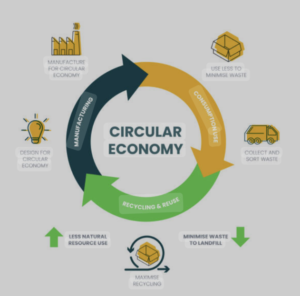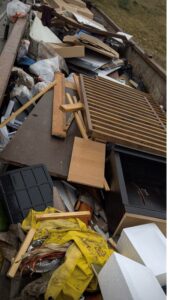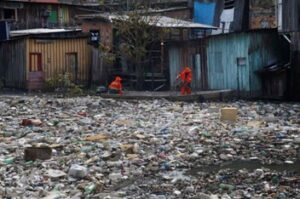When an act is morally right and economically justified it is attractive and easy to accomplish. But when it is not… caring for Creation is a first order responsibility!
I have been thinking for some time about my impact on Creation. A previous issue of Creation’s Corner — CREATION’S CORNER #32 – HOW IS YOUR ECOLOGICAL HEALTH? – considered the size of one’s ecological footprint. I continue to be concerned about reducing my own impact on Creation. Do you share that concern?
 Can you imagine living in a near zero waste society where the “stuff” you purchase leaves your house as compost or recycling (including thrift shops, swap meets, etc.) with virtually no waste going “away” into what we now refer to as “sanitary land fills”? Sports arenas, businesses, homes, and other structures would be designed to last, and, in the end, they would be dismantled with the “parts” utilized in new construction. In short, we would move from the current “cradle to grave” society where we “try to” assure appropriate “disposal” of our stuff, to a cradle-to-cradle society where our discards serve as the resources for new products and buildings. This is referred to as a “Circular Economy”. Today the average U.S. citizen produces 1800 pounds of trash (4.9 pounds per day)! Is moving to a zero-waste society even possible?
Can you imagine living in a near zero waste society where the “stuff” you purchase leaves your house as compost or recycling (including thrift shops, swap meets, etc.) with virtually no waste going “away” into what we now refer to as “sanitary land fills”? Sports arenas, businesses, homes, and other structures would be designed to last, and, in the end, they would be dismantled with the “parts” utilized in new construction. In short, we would move from the current “cradle to grave” society where we “try to” assure appropriate “disposal” of our stuff, to a cradle-to-cradle society where our discards serve as the resources for new products and buildings. This is referred to as a “Circular Economy”. Today the average U.S. citizen produces 1800 pounds of trash (4.9 pounds per day)! Is moving to a zero-waste society even possible?
In my experience, our day-to-day behavior and choices are typically based on whether it is easy, comfortable, monetarily wise, and takes little time. In short, we don’t want to bother to “go out of our way”.
Many tribes base their decisions on the 7th generation principle – the idea that people should make decisions that are sustainable for the long term (7 generations!). The Biblical view is for us to live in God’s Kingdom today, caring for it as stewards, until Christ returns to establish His everlasting Kingdom. How are we doing? It doesn’t seem very well!
 Each of us can choose to alter our way of life to reduce the amount of waste that we produce by day-to-day and moment-to-moment decisions. But addressing the problem on a larger scale will require both political and economic drivers. In many, if not most cases, the companies that handle garbage collection and recycling services are owned by the same parent company. It is an economic decision for the company – which brings in the most money, trash or recycling? If there is no economically viable market for the potential recycled product, it goes into the garbage since no recycling option is provided. But even if a market exists, potentially recycled objects often go into the trash for expediency – see the photo (right) taken on 11.25.2024 by Joe Sheldon at the Coupeville solid waste transfer station. The abundant cardboard, metal, paper, glass, and plastics could (and should) have easily been recycled!
Each of us can choose to alter our way of life to reduce the amount of waste that we produce by day-to-day and moment-to-moment decisions. But addressing the problem on a larger scale will require both political and economic drivers. In many, if not most cases, the companies that handle garbage collection and recycling services are owned by the same parent company. It is an economic decision for the company – which brings in the most money, trash or recycling? If there is no economically viable market for the potential recycled product, it goes into the garbage since no recycling option is provided. But even if a market exists, potentially recycled objects often go into the trash for expediency – see the photo (right) taken on 11.25.2024 by Joe Sheldon at the Coupeville solid waste transfer station. The abundant cardboard, metal, paper, glass, and plastics could (and should) have easily been recycled!
If our current system is broken (we discard essential “stuff” that should be the feed stock for new products) — and suitable sites for new landfills are scarce, what can be done today to live more sustainably for tomorrow? The fifth Intergovernmental Negotiating Committee (INC-5) met from Nov. 25 to Dec. 1, 2024 in Busan, South Kerea to deal with the monumental problem of plastic pollution. No deal (again) was reached on efforts to reduce production. Big oil blocked any effort since plastic is an oil product. Many forms of plastic are difficult to reprocess. I can only recycle plastics #1 and 2 at the local recycling centers. Plastic bags go to local grocery store sites. Much of my plastic is #5 and can not be recycled here. I take it to Seattle for recycling. What do you do? If it can not be recycled, it, with some exceptions, should not be produced – you may disagree.
Packaging material comprises a major part of the waste stream. Many governments have greatly reduced the volume of their waste by requiring producing companies to take back their own packaging materials with amazing results — the amount of packaging used rapidly decreased e.g. British Columbia and much of Europe!
The recycling rate in the US is far less than in many other countries. What are other countries doing?
Deposit return systems: Countries like Sweden use deposit systems to pay people back when they recycle. Currently 10 U.S. states have “bottle bills” requiring deposits. Less roadside trash!
Fees and fines: Countries like Switzerland and Austria charge high fees or impose fines for not recycling.
Extended producer responsibility (EPR): EPR laws shift the responsibility for post-consumer products from municipalities to the manufacturer. E.g. packaging material above!
Public awareness campaigns: Governments can run campaigns to raise awareness about recycling.
Rewarding citizens: Some countries reward citizens for recycling, with discount coupons, points systems, or cash.
Rigid sorting guidelines: Countries like Japan have strict guidelines for sorting trash by day of the week.
Automated bins: Countries like Switzerland use automated bins that weigh food waste and charge residents based on how much they deposit.
E-waste facilities: Countries like Wales have e-waste facilities that extract precious metals from e-waste at room temperature.
Waste-to-energy schemes: Countries like Sweden use waste-to-energy schemes as a short-term solution, while also increasing recycling and renewable energy capacity. Burning waste, however, increases air pollution.
The bottom line is that recycling is a personal choice. Trashing God’s Creation is a form of blasphemy whereas recycling can/should be viewed as one form of our worship! One can and bottle at a time….
Prayer for the day: Lord Jesus, “…turn us from careless tenants to faithful stewards, that your threefold blessings of clean air, pure water, and rich earth may be the inheritance of everything that has the breath of life…”. By the Reverend Libby Lane, Bishop of Derby.
Thanks for listening.
— Joe Sheldon
Direct comments to Joe Sheldon at jksheldon43@gmail.com
If you would like to receive additional information on Creation care, notices of special events, Creation walks I lead, etc. please contact me at the above address and I will add you to my e-mail list. Your comments are welcome.



